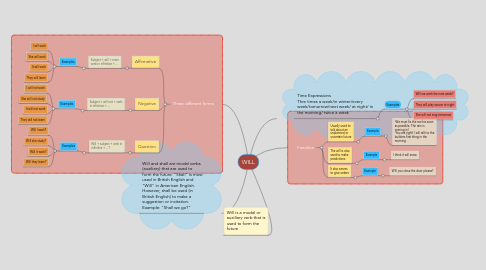
1. Three different forms
1.1. Affirmative
1.1.1. Subject + will + main verb in infinitive + ...
1.1.1.1. Examples
1.1.1.1.1. I will work
1.1.1.1.2. She will work
1.1.1.1.3. It will work
1.1.1.1.4. They will learn
1.2. Negative
1.2.1. Subject + will not + verb in infinitive + ...
1.2.1.1. Examples
1.2.1.1.1. I will not work
1.2.1.1.2. She will not study
1.2.1.1.3. It will not work
1.2.1.1.4. They will not learn
1.3. Question
1.3.1. Will + subject + verb in infinitive + ...?
1.3.1.1. Examples
1.3.1.1.1. Will I work?
1.3.1.1.2. Will she study?
1.3.1.1.3. Will it work?
1.3.1.1.4. Will they learn?
2. Will is a modal or auxiliary verb that is used to form the future
3. Will and shall are modal verbs (auxiliary) that are used to form the future. "Shall" is most used in British English and "Will" in American English. However, shall be used (in British English) to make a suggestion or invitation. Example: "Shall we go?"
4. Function
4.1. Usually used to talk about an unplanned or uncertain future
4.1.1. Example
4.1.1.1. -We must fix the roof as soon as possible. The rain is coming in! -You are right! I will talk to the builders first thing in the morning
4.2. The will is also used to make predictions
4.2.1. Example
4.2.1.1. I think it will snow
4.3. It also serves to give orders
4.3.1. Example
4.3.1.1. Will you close the door please?
5. Time Expressions Thre times a week/in winter/every week/tomorrow/next week/ at night/ in the morning/ twice a week
5.1. Examples
5.1.1. Will we work the next week?
5.1.2. They will play soccer at night
5.1.3. She will not sing tomorrow
